Garcia v National Bank Ltd: Case Analysis for LAWS104 Course
VerifiedAdded on 2023/01/16
|8
|1656
|50
Case Study
AI Summary
This case analysis examines Garcia v National Australia Bank Ltd, a landmark case concerning the enforceability of guarantees. The analysis begins with a presentation of the facts, where Jean Garcia provided guarantees for her husband's company. It then traces the legal proceedings, from the Supreme Court of New South Wales to the High Court of Australia, highlighting the decisions of each court and the grounds for appeal. The analysis delves into the High Court's decision, including the majority and dissenting judgments, focusing on the application of the Yerkey v Jones principle and the concept of unconscionability. It also includes the final decision of the High Court, the ratio decidendi, and the obiter dictum. The document concludes with a bibliography of sources used in the analysis.
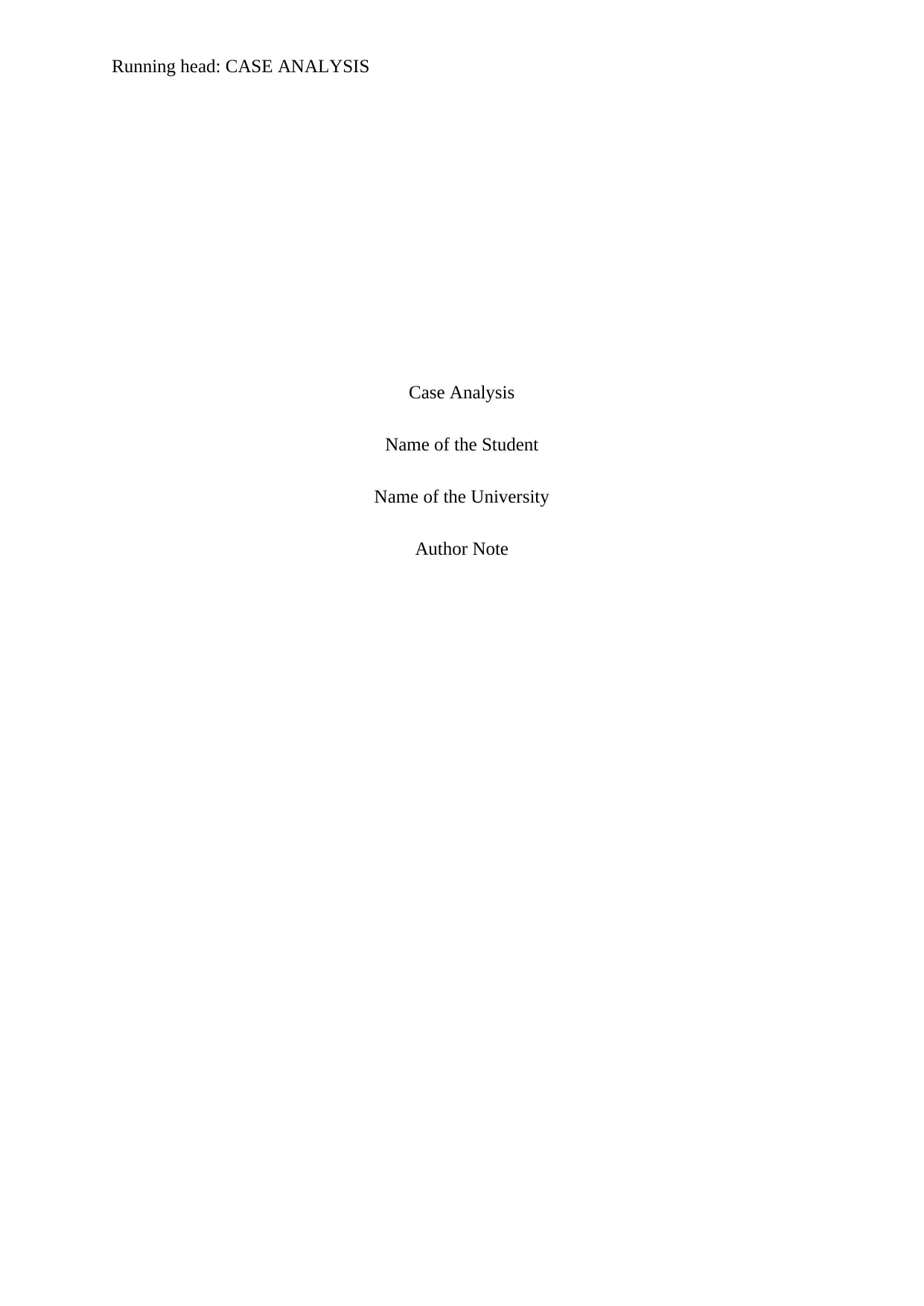
Running head: CASE ANALYSIS
Case Analysis
Name of the Student
Name of the University
Author Note
Case Analysis
Name of the Student
Name of the University
Author Note
Paraphrase This Document
Need a fresh take? Get an instant paraphrase of this document with our AI Paraphraser
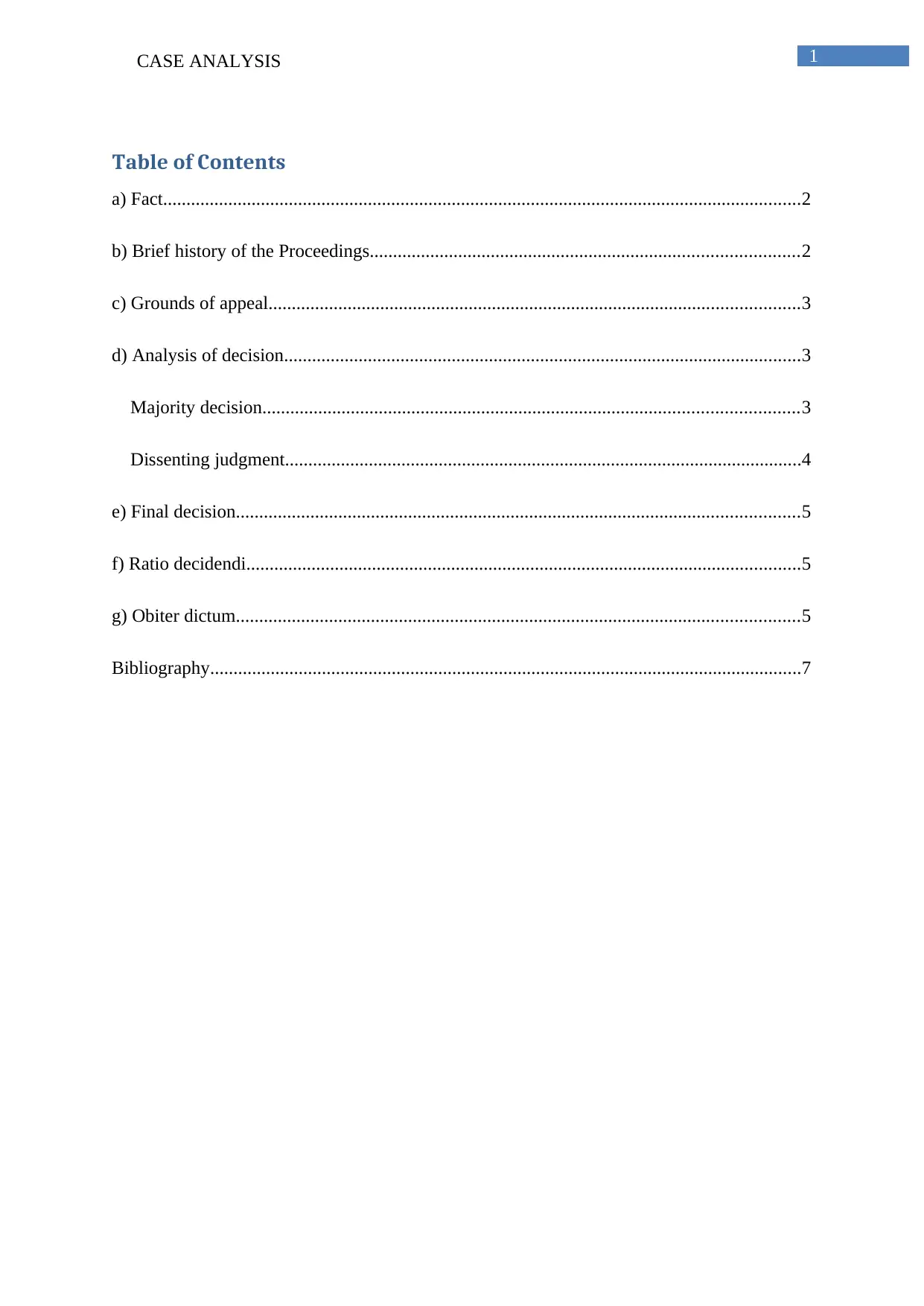
1CASE ANALYSIS
Table of Contents
a) Fact.........................................................................................................................................2
b) Brief history of the Proceedings............................................................................................2
c) Grounds of appeal..................................................................................................................3
d) Analysis of decision...............................................................................................................3
Majority decision...................................................................................................................3
Dissenting judgment...............................................................................................................4
e) Final decision.........................................................................................................................5
f) Ratio decidendi.......................................................................................................................5
g) Obiter dictum.........................................................................................................................5
Bibliography...............................................................................................................................7
Table of Contents
a) Fact.........................................................................................................................................2
b) Brief history of the Proceedings............................................................................................2
c) Grounds of appeal..................................................................................................................3
d) Analysis of decision...............................................................................................................3
Majority decision...................................................................................................................3
Dissenting judgment...............................................................................................................4
e) Final decision.........................................................................................................................5
f) Ratio decidendi.......................................................................................................................5
g) Obiter dictum.........................................................................................................................5
Bibliography...............................................................................................................................7
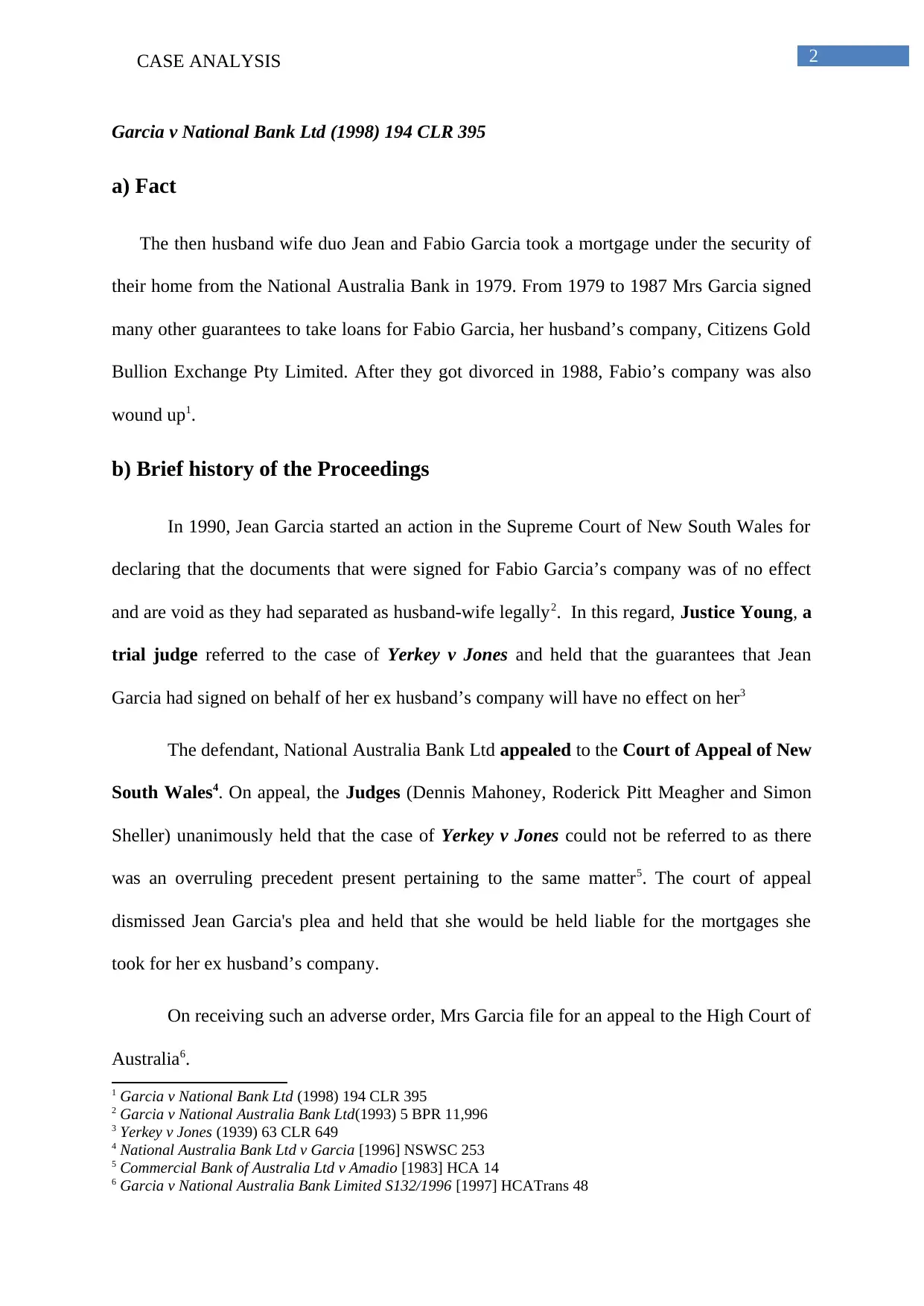
2CASE ANALYSIS
Garcia v National Bank Ltd (1998) 194 CLR 395
a) Fact
The then husband wife duo Jean and Fabio Garcia took a mortgage under the security of
their home from the National Australia Bank in 1979. From 1979 to 1987 Mrs Garcia signed
many other guarantees to take loans for Fabio Garcia, her husband’s company, Citizens Gold
Bullion Exchange Pty Limited. After they got divorced in 1988, Fabio’s company was also
wound up1.
b) Brief history of the Proceedings
In 1990, Jean Garcia started an action in the Supreme Court of New South Wales for
declaring that the documents that were signed for Fabio Garcia’s company was of no effect
and are void as they had separated as husband-wife legally2. In this regard, Justice Young, a
trial judge referred to the case of Yerkey v Jones and held that the guarantees that Jean
Garcia had signed on behalf of her ex husband’s company will have no effect on her3
The defendant, National Australia Bank Ltd appealed to the Court of Appeal of New
South Wales4. On appeal, the Judges (Dennis Mahoney, Roderick Pitt Meagher and Simon
Sheller) unanimously held that the case of Yerkey v Jones could not be referred to as there
was an overruling precedent present pertaining to the same matter5. The court of appeal
dismissed Jean Garcia's plea and held that she would be held liable for the mortgages she
took for her ex husband’s company.
On receiving such an adverse order, Mrs Garcia file for an appeal to the High Court of
Australia6.
1 Garcia v National Bank Ltd (1998) 194 CLR 395
2 Garcia v National Australia Bank Ltd(1993) 5 BPR 11,996
3 Yerkey v Jones (1939) 63 CLR 649
4 National Australia Bank Ltd v Garcia [1996] NSWSC 253
5 Commercial Bank of Australia Ltd v Amadio [1983] HCA 14
6 Garcia v National Australia Bank Limited S132/1996 [1997] HCATrans 48
Garcia v National Bank Ltd (1998) 194 CLR 395
a) Fact
The then husband wife duo Jean and Fabio Garcia took a mortgage under the security of
their home from the National Australia Bank in 1979. From 1979 to 1987 Mrs Garcia signed
many other guarantees to take loans for Fabio Garcia, her husband’s company, Citizens Gold
Bullion Exchange Pty Limited. After they got divorced in 1988, Fabio’s company was also
wound up1.
b) Brief history of the Proceedings
In 1990, Jean Garcia started an action in the Supreme Court of New South Wales for
declaring that the documents that were signed for Fabio Garcia’s company was of no effect
and are void as they had separated as husband-wife legally2. In this regard, Justice Young, a
trial judge referred to the case of Yerkey v Jones and held that the guarantees that Jean
Garcia had signed on behalf of her ex husband’s company will have no effect on her3
The defendant, National Australia Bank Ltd appealed to the Court of Appeal of New
South Wales4. On appeal, the Judges (Dennis Mahoney, Roderick Pitt Meagher and Simon
Sheller) unanimously held that the case of Yerkey v Jones could not be referred to as there
was an overruling precedent present pertaining to the same matter5. The court of appeal
dismissed Jean Garcia's plea and held that she would be held liable for the mortgages she
took for her ex husband’s company.
On receiving such an adverse order, Mrs Garcia file for an appeal to the High Court of
Australia6.
1 Garcia v National Bank Ltd (1998) 194 CLR 395
2 Garcia v National Australia Bank Ltd(1993) 5 BPR 11,996
3 Yerkey v Jones (1939) 63 CLR 649
4 National Australia Bank Ltd v Garcia [1996] NSWSC 253
5 Commercial Bank of Australia Ltd v Amadio [1983] HCA 14
6 Garcia v National Australia Bank Limited S132/1996 [1997] HCATrans 48
⊘ This is a preview!⊘
Do you want full access?
Subscribe today to unlock all pages.

Trusted by 1+ million students worldwide
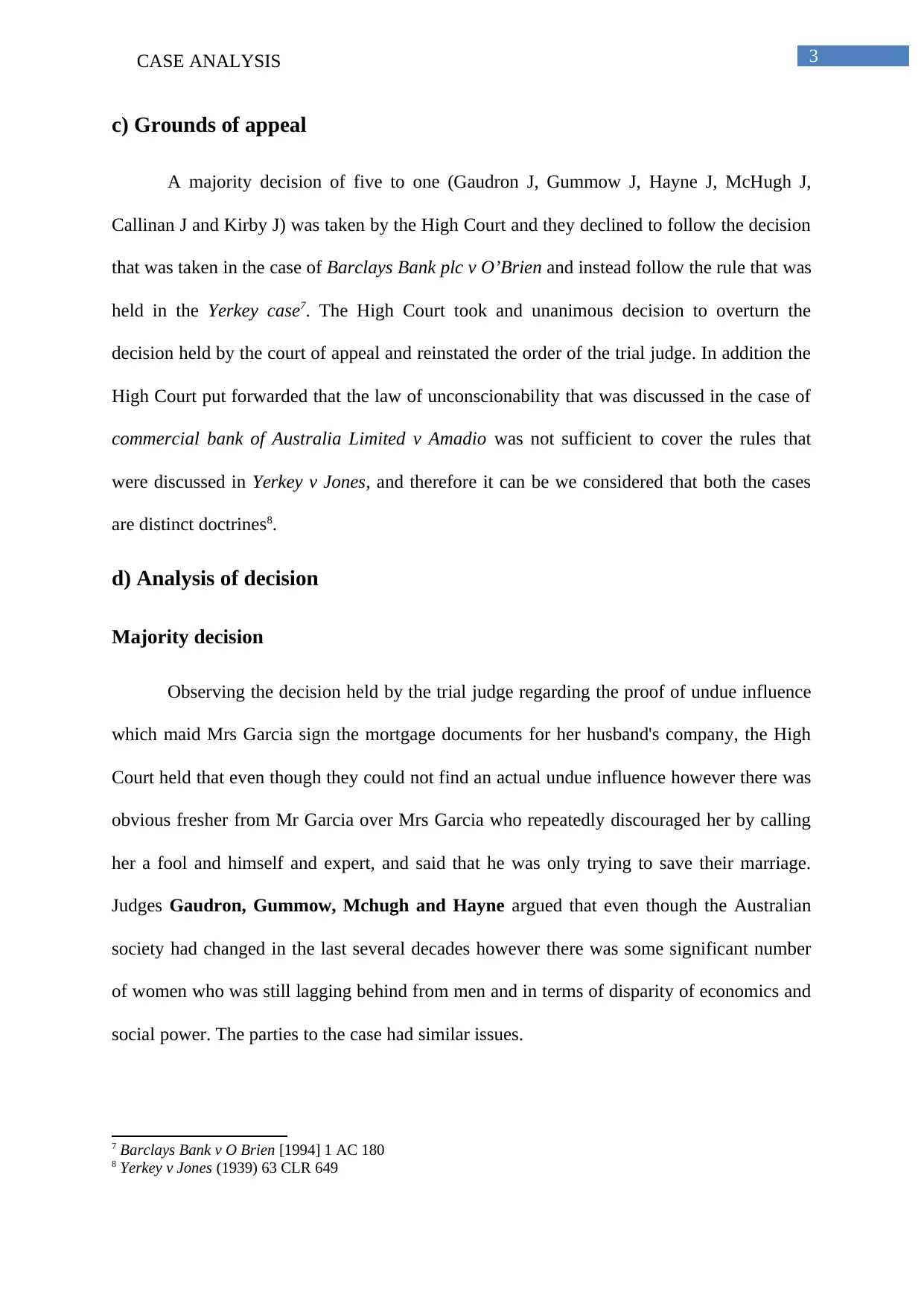
3CASE ANALYSIS
c) Grounds of appeal
A majority decision of five to one (Gaudron J, Gummow J, Hayne J, McHugh J,
Callinan J and Kirby J) was taken by the High Court and they declined to follow the decision
that was taken in the case of Barclays Bank plc v O’Brien and instead follow the rule that was
held in the Yerkey case7. The High Court took and unanimous decision to overturn the
decision held by the court of appeal and reinstated the order of the trial judge. In addition the
High Court put forwarded that the law of unconscionability that was discussed in the case of
commercial bank of Australia Limited v Amadio was not sufficient to cover the rules that
were discussed in Yerkey v Jones, and therefore it can be we considered that both the cases
are distinct doctrines8.
d) Analysis of decision
Majority decision
Observing the decision held by the trial judge regarding the proof of undue influence
which maid Mrs Garcia sign the mortgage documents for her husband's company, the High
Court held that even though they could not find an actual undue influence however there was
obvious fresher from Mr Garcia over Mrs Garcia who repeatedly discouraged her by calling
her a fool and himself and expert, and said that he was only trying to save their marriage.
Judges Gaudron, Gummow, Mchugh and Hayne argued that even though the Australian
society had changed in the last several decades however there was some significant number
of women who was still lagging behind from men and in terms of disparity of economics and
social power. The parties to the case had similar issues.
7 Barclays Bank v O Brien [1994] 1 AC 180
8 Yerkey v Jones (1939) 63 CLR 649
c) Grounds of appeal
A majority decision of five to one (Gaudron J, Gummow J, Hayne J, McHugh J,
Callinan J and Kirby J) was taken by the High Court and they declined to follow the decision
that was taken in the case of Barclays Bank plc v O’Brien and instead follow the rule that was
held in the Yerkey case7. The High Court took and unanimous decision to overturn the
decision held by the court of appeal and reinstated the order of the trial judge. In addition the
High Court put forwarded that the law of unconscionability that was discussed in the case of
commercial bank of Australia Limited v Amadio was not sufficient to cover the rules that
were discussed in Yerkey v Jones, and therefore it can be we considered that both the cases
are distinct doctrines8.
d) Analysis of decision
Majority decision
Observing the decision held by the trial judge regarding the proof of undue influence
which maid Mrs Garcia sign the mortgage documents for her husband's company, the High
Court held that even though they could not find an actual undue influence however there was
obvious fresher from Mr Garcia over Mrs Garcia who repeatedly discouraged her by calling
her a fool and himself and expert, and said that he was only trying to save their marriage.
Judges Gaudron, Gummow, Mchugh and Hayne argued that even though the Australian
society had changed in the last several decades however there was some significant number
of women who was still lagging behind from men and in terms of disparity of economics and
social power. The parties to the case had similar issues.
7 Barclays Bank v O Brien [1994] 1 AC 180
8 Yerkey v Jones (1939) 63 CLR 649
Paraphrase This Document
Need a fresh take? Get an instant paraphrase of this document with our AI Paraphraser
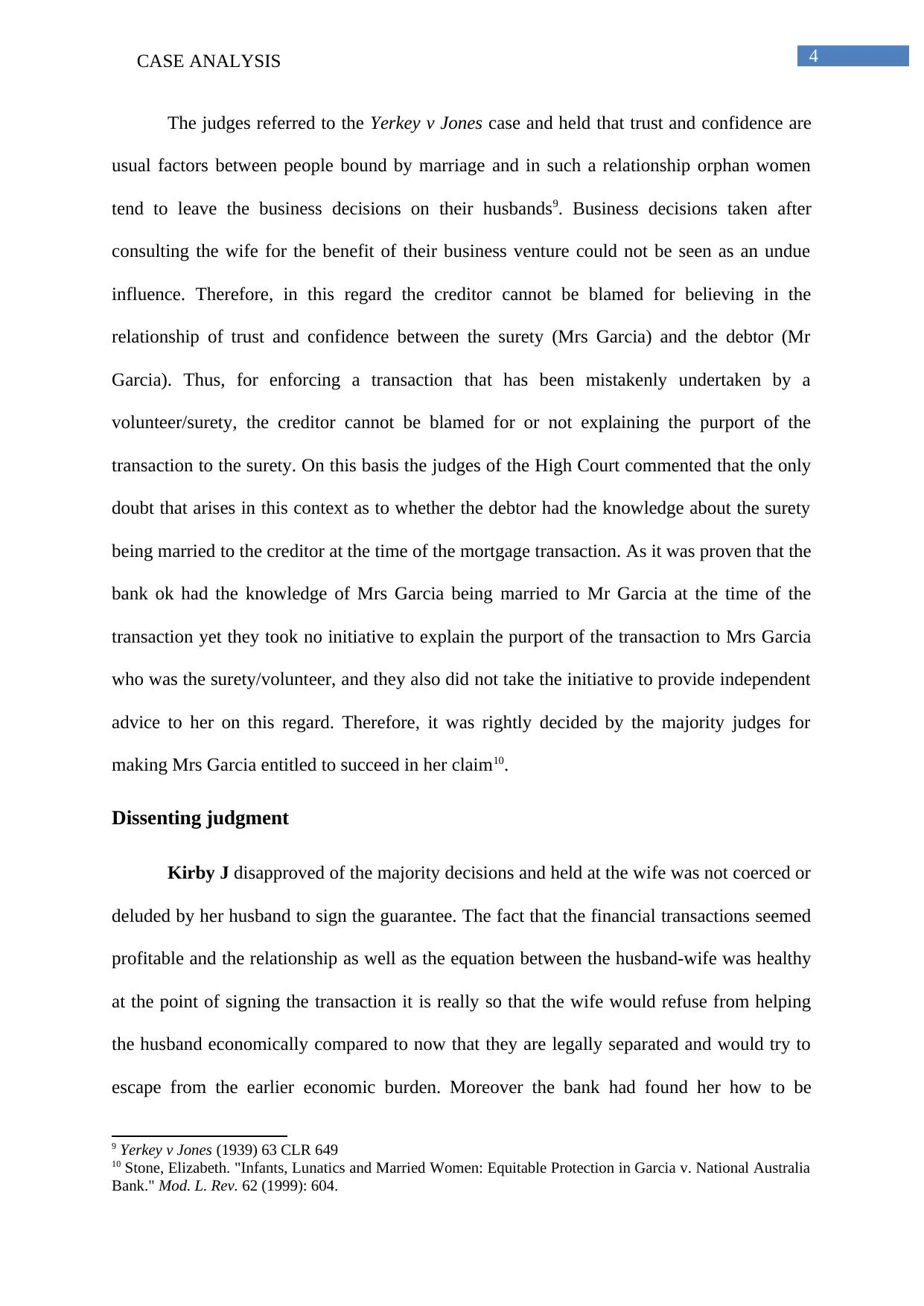
4CASE ANALYSIS
The judges referred to the Yerkey v Jones case and held that trust and confidence are
usual factors between people bound by marriage and in such a relationship orphan women
tend to leave the business decisions on their husbands9. Business decisions taken after
consulting the wife for the benefit of their business venture could not be seen as an undue
influence. Therefore, in this regard the creditor cannot be blamed for believing in the
relationship of trust and confidence between the surety (Mrs Garcia) and the debtor (Mr
Garcia). Thus, for enforcing a transaction that has been mistakenly undertaken by a
volunteer/surety, the creditor cannot be blamed for or not explaining the purport of the
transaction to the surety. On this basis the judges of the High Court commented that the only
doubt that arises in this context as to whether the debtor had the knowledge about the surety
being married to the creditor at the time of the mortgage transaction. As it was proven that the
bank ok had the knowledge of Mrs Garcia being married to Mr Garcia at the time of the
transaction yet they took no initiative to explain the purport of the transaction to Mrs Garcia
who was the surety/volunteer, and they also did not take the initiative to provide independent
advice to her on this regard. Therefore, it was rightly decided by the majority judges for
making Mrs Garcia entitled to succeed in her claim10.
Dissenting judgment
Kirby J disapproved of the majority decisions and held at the wife was not coerced or
deluded by her husband to sign the guarantee. The fact that the financial transactions seemed
profitable and the relationship as well as the equation between the husband-wife was healthy
at the point of signing the transaction it is really so that the wife would refuse from helping
the husband economically compared to now that they are legally separated and would try to
escape from the earlier economic burden. Moreover the bank had found her how to be
9 Yerkey v Jones (1939) 63 CLR 649
10 Stone, Elizabeth. "Infants, Lunatics and Married Women: Equitable Protection in Garcia v. National Australia
Bank." Mod. L. Rev. 62 (1999): 604.
The judges referred to the Yerkey v Jones case and held that trust and confidence are
usual factors between people bound by marriage and in such a relationship orphan women
tend to leave the business decisions on their husbands9. Business decisions taken after
consulting the wife for the benefit of their business venture could not be seen as an undue
influence. Therefore, in this regard the creditor cannot be blamed for believing in the
relationship of trust and confidence between the surety (Mrs Garcia) and the debtor (Mr
Garcia). Thus, for enforcing a transaction that has been mistakenly undertaken by a
volunteer/surety, the creditor cannot be blamed for or not explaining the purport of the
transaction to the surety. On this basis the judges of the High Court commented that the only
doubt that arises in this context as to whether the debtor had the knowledge about the surety
being married to the creditor at the time of the mortgage transaction. As it was proven that the
bank ok had the knowledge of Mrs Garcia being married to Mr Garcia at the time of the
transaction yet they took no initiative to explain the purport of the transaction to Mrs Garcia
who was the surety/volunteer, and they also did not take the initiative to provide independent
advice to her on this regard. Therefore, it was rightly decided by the majority judges for
making Mrs Garcia entitled to succeed in her claim10.
Dissenting judgment
Kirby J disapproved of the majority decisions and held at the wife was not coerced or
deluded by her husband to sign the guarantee. The fact that the financial transactions seemed
profitable and the relationship as well as the equation between the husband-wife was healthy
at the point of signing the transaction it is really so that the wife would refuse from helping
the husband economically compared to now that they are legally separated and would try to
escape from the earlier economic burden. Moreover the bank had found her how to be
9 Yerkey v Jones (1939) 63 CLR 649
10 Stone, Elizabeth. "Infants, Lunatics and Married Women: Equitable Protection in Garcia v. National Australia
Bank." Mod. L. Rev. 62 (1999): 604.
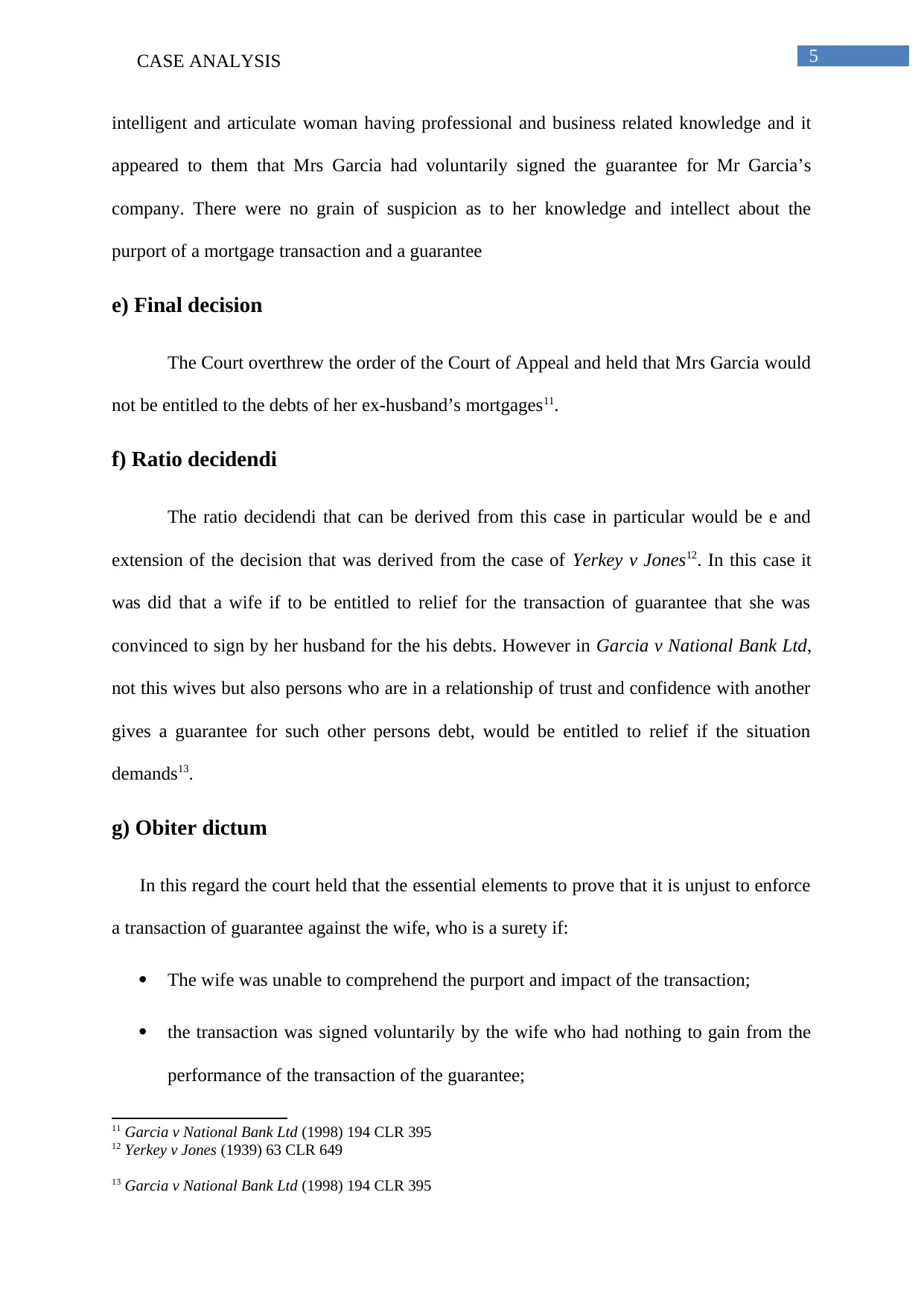
5CASE ANALYSIS
intelligent and articulate woman having professional and business related knowledge and it
appeared to them that Mrs Garcia had voluntarily signed the guarantee for Mr Garcia’s
company. There were no grain of suspicion as to her knowledge and intellect about the
purport of a mortgage transaction and a guarantee
e) Final decision
The Court overthrew the order of the Court of Appeal and held that Mrs Garcia would
not be entitled to the debts of her ex-husband’s mortgages11.
f) Ratio decidendi
The ratio decidendi that can be derived from this case in particular would be e and
extension of the decision that was derived from the case of Yerkey v Jones12. In this case it
was did that a wife if to be entitled to relief for the transaction of guarantee that she was
convinced to sign by her husband for the his debts. However in Garcia v National Bank Ltd,
not this wives but also persons who are in a relationship of trust and confidence with another
gives a guarantee for such other persons debt, would be entitled to relief if the situation
demands13.
g) Obiter dictum
In this regard the court held that the essential elements to prove that it is unjust to enforce
a transaction of guarantee against the wife, who is a surety if:
The wife was unable to comprehend the purport and impact of the transaction;
the transaction was signed voluntarily by the wife who had nothing to gain from the
performance of the transaction of the guarantee;
11 Garcia v National Bank Ltd (1998) 194 CLR 395
12 Yerkey v Jones (1939) 63 CLR 649
13 Garcia v National Bank Ltd (1998) 194 CLR 395
intelligent and articulate woman having professional and business related knowledge and it
appeared to them that Mrs Garcia had voluntarily signed the guarantee for Mr Garcia’s
company. There were no grain of suspicion as to her knowledge and intellect about the
purport of a mortgage transaction and a guarantee
e) Final decision
The Court overthrew the order of the Court of Appeal and held that Mrs Garcia would
not be entitled to the debts of her ex-husband’s mortgages11.
f) Ratio decidendi
The ratio decidendi that can be derived from this case in particular would be e and
extension of the decision that was derived from the case of Yerkey v Jones12. In this case it
was did that a wife if to be entitled to relief for the transaction of guarantee that she was
convinced to sign by her husband for the his debts. However in Garcia v National Bank Ltd,
not this wives but also persons who are in a relationship of trust and confidence with another
gives a guarantee for such other persons debt, would be entitled to relief if the situation
demands13.
g) Obiter dictum
In this regard the court held that the essential elements to prove that it is unjust to enforce
a transaction of guarantee against the wife, who is a surety if:
The wife was unable to comprehend the purport and impact of the transaction;
the transaction was signed voluntarily by the wife who had nothing to gain from the
performance of the transaction of the guarantee;
11 Garcia v National Bank Ltd (1998) 194 CLR 395
12 Yerkey v Jones (1939) 63 CLR 649
13 Garcia v National Bank Ltd (1998) 194 CLR 395
⊘ This is a preview!⊘
Do you want full access?
Subscribe today to unlock all pages.

Trusted by 1+ million students worldwide

6CASE ANALYSIS
The debtor did not take the necessary steps to make the surety aware of the purport
and impact of the transaction14.
14 Stone, Elizabeth. "Infants, Lunatics and Married Women: Equitable Protection in Garcia v. National Australia
Bank." Mod. L. Rev. 62 (1999): 604.
The debtor did not take the necessary steps to make the surety aware of the purport
and impact of the transaction14.
14 Stone, Elizabeth. "Infants, Lunatics and Married Women: Equitable Protection in Garcia v. National Australia
Bank." Mod. L. Rev. 62 (1999): 604.
Paraphrase This Document
Need a fresh take? Get an instant paraphrase of this document with our AI Paraphraser
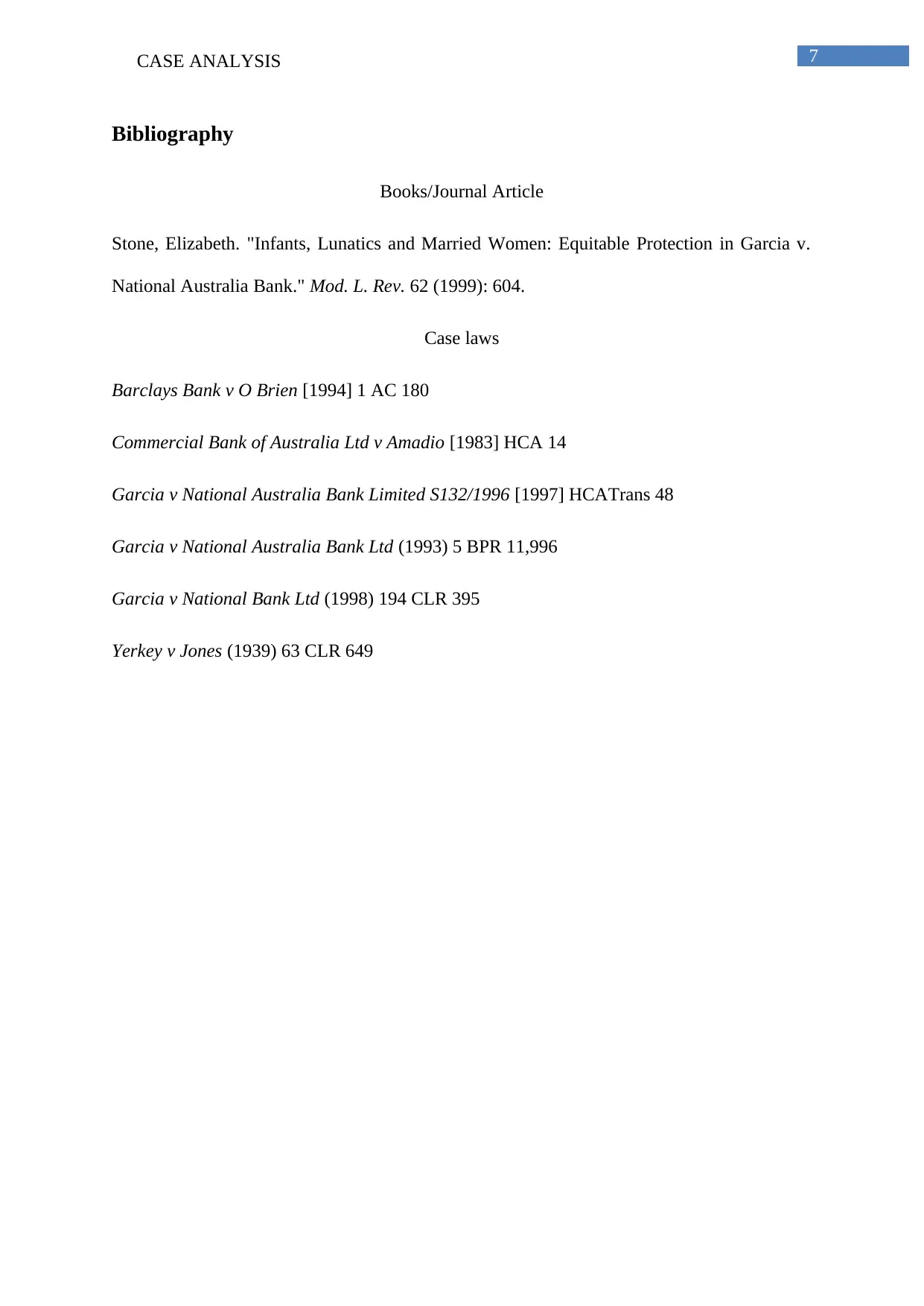
7CASE ANALYSIS
Bibliography
Books/Journal Article
Stone, Elizabeth. "Infants, Lunatics and Married Women: Equitable Protection in Garcia v.
National Australia Bank." Mod. L. Rev. 62 (1999): 604.
Case laws
Barclays Bank v O Brien [1994] 1 AC 180
Commercial Bank of Australia Ltd v Amadio [1983] HCA 14
Garcia v National Australia Bank Limited S132/1996 [1997] HCATrans 48
Garcia v National Australia Bank Ltd (1993) 5 BPR 11,996
Garcia v National Bank Ltd (1998) 194 CLR 395
Yerkey v Jones (1939) 63 CLR 649
Bibliography
Books/Journal Article
Stone, Elizabeth. "Infants, Lunatics and Married Women: Equitable Protection in Garcia v.
National Australia Bank." Mod. L. Rev. 62 (1999): 604.
Case laws
Barclays Bank v O Brien [1994] 1 AC 180
Commercial Bank of Australia Ltd v Amadio [1983] HCA 14
Garcia v National Australia Bank Limited S132/1996 [1997] HCATrans 48
Garcia v National Australia Bank Ltd (1993) 5 BPR 11,996
Garcia v National Bank Ltd (1998) 194 CLR 395
Yerkey v Jones (1939) 63 CLR 649
1 out of 8
Related Documents
Your All-in-One AI-Powered Toolkit for Academic Success.
+13062052269
info@desklib.com
Available 24*7 on WhatsApp / Email
![[object Object]](/_next/static/media/star-bottom.7253800d.svg)
Unlock your academic potential
Copyright © 2020–2026 A2Z Services. All Rights Reserved. Developed and managed by ZUCOL.



